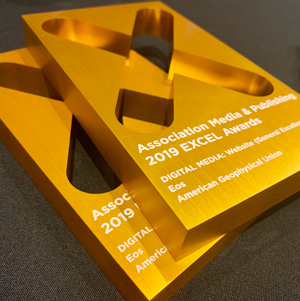Five years ago, AGU transformed its news publication from a weekly tabloid mailed to members into a free-to-all, digital-first publication at Eos.org. Our website has allowed us to bring the work of Earth and space scientists directly to the public by reporting on the most updated research and publishing work by scientists who explain why their work is so important and give us a behind-the-scenes look at how it all happens.

In recognition of this work, on 24 June, Eos took home two 2019 Gold EXCEL awards for Digital Media—in Editorial Excellence and General Excellence—from Association Media & Publishing. We are so proud to present articles to our readers of this caliber and eager to take the next step in working with our science authors.
Today, we’re excited to announce several changes at Eos, which I’ll describe for you, our scientist-authors, below:
- transition from manuscript submission to article proposal submission
- guided process for authors of accepted proposals
- closing of the GEMS portal for Eos
- updated content types on Eos
New Proposal Submission
With a goal to make the publishing process better for scientists, Eos is transitioning to a proposal submission process. New guidelines for authors and FAQs are online now, which offer a better explanation of our content types.
Our proposal form is streamlined and easy to fill out. Authors should be prepared to submit the following:
- the focus of the article (100 words)
- the key points the article will make (200 words)
- why this article is important for Eos readers (200 words)
Each proposal will be reviewed for both scientific content and interest to our readers by our science advisers, experts in their fields representing each AGU section.
Authors whose proposals are accepted will be put in touch with an Eos staff editor and receive guidance on how best to approach writing their manuscript. We hope that this new process assists scientists in communicating their important work to a broader audience and reduces the editing time on resulting manuscripts.
GEMS Closes in September
Until 3 September, we will continue to accept direct manuscript submissions through GEMS; after that date the portal will close.
Until 3 September, we will continue to accept direct manuscript submissions through GEMS; after that date the portal will close.
Manuscripts can still be submitted through our proposal submission form, though we highly encourage scientists to take advantage of our new article proposal system immediately.
Note: Once GEMS for Eos closes, scientists will still have access to their archived submissions for Eos. This change has no effect on access to AGU journals.
Content Type Changes
We’ve also updated our content types to better align with what authors are submitting.
Project Updates have been renamed Science Updates.
The Meeting Report content type has been eliminated. These reports—which must consist of insight and contextual information about discussions or results from the meeting, workshop, or conference—can now be submitted under Science Updates.
Eos’s Ongoing Mission to Share Science
Our goal, as always, is to ensure your important science reaches the worldwide science community and the science-interested public.
Our goal, as always, is to ensure your important science reaches the worldwide science community and the science-interested public.
By making these changes, not only will we better accomplish that goal, but we’ll make the process easier and quicker—an important consideration given how many responsibilities we know scientists are balancing. On behalf of the entire Eos team at AGU and our science advisers, we look forward to engaging our readers with your critical contributions to Earth and space science.
—Heather Goss (@heathermg), Editor in Chief
Citation:
Goss, H. (2019), Changes to the Eos scientist-authored submission process, Eos, 100, https://doi.org/10.1029/2019EO127971. Published on 08 July 2019.
Text © 2019. AGU. CC BY-NC-ND 3.0
Except where otherwise noted, images are subject to copyright. Any reuse without express permission from the copyright owner is prohibited.

